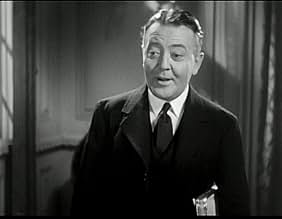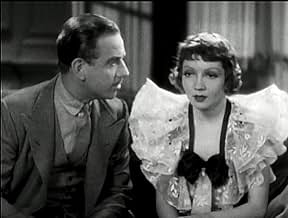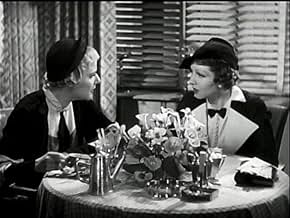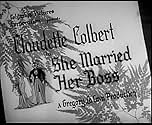NOTE IMDb
6,5/10
775
MA NOTE
Ajouter une intrigue dans votre langueAn efficient secretary at a department store marries her boss, but discovers that taking care of him at home is a lot different to taking care of him at work.An efficient secretary at a department store marries her boss, but discovers that taking care of him at home is a lot different to taking care of him at work.An efficient secretary at a department store marries her boss, but discovers that taking care of him at home is a lot different to taking care of him at work.
- Réalisation
- Scénario
- Casting principal
- Récompenses
- 1 victoire au total
Grace Hayle
- Agnes Mayo
- (as Grace Hale)
Ernie Adams
- Passerby
- (non crédité)
William Arnold
- Department Head
- (non crédité)
Lynton Brent
- Assistant Window Dresser
- (non crédité)
Edmund Burns
- Newspaper Photographer
- (non crédité)
A.S. 'Pop' Byron
- Store Watchman
- (non crédité)
Avis à la une
I've read the other comments that talked about aspects of this film that are dated, offensive, or just plain bizarre. I was rather surprised that no one brought up the movie's cringe-inducing gender stereotypes. Anyone who has seen Claudette Colbert or Melvyn Douglas in the films they made before the introduction of the Production Code(in mid-1934) would immediately recognize the heavy hand of the censors, who did their best to impose on Hollywood their narrow-minded idea of "family values." (On the basis of this film, it would appear that allowing married women to pursue a career would bring about the end of American society, but child abuse and drunk driving are just good clean fun!) Though the cast and plot look good on paper, the result is strained and uneven, as if the script had been written to Pre-Code standards and then hastily cleaned up so as not to offend the censors.
Claudette Colbert plays Julia Scott, a bright, capable, and confident executive assistant at a large department store. She runs the busy office like a well-oiled machine and clearly enjoys the work. It's hard to fathom why she's spent six years mooning over her boss, Richard Barclay. The way the role of Barclay is written, the usually charming Melvyn Douglas comes off as a humorless, sexless cipher. All the more jarring, then, to hear Julia talk about her desire to give up her terrific job and marry Barclay. Without a trace of irony, she describes marriage as "a woman's REAL career."
Okay, she wants to get married. But why on earth would the lovely and vivacious Julia want Barclay as a husband? Not only is he dull as ditch-water, he treats her as if she were a piece of super-efficient office equipment. Once they're married, he ridicules her for assuming the stereotypical role of housewife, despite the fact that she's set his chaotic home in order and tamed his obnoxious brat of a daughter. There's nothing in the movie to explain Barclay's eventual change of heart; apparently it's brought on by a quart of whiskey. So much for good old "family values." The film is so devoid of any hint of sexual attraction that we don't see a single cuddle or smooch--not even at the very end when it's clear that the newlyweds will finally get around to doing what newlyweds are famous for doing. Julia has more physical contact (and chemistry) with Leonard Rogers, her sweet-tempered playboy suitor, who's a lot more appealing as husband material than that cold fish Barclay.
Solid performances are turned in by familiar actors in some of the secondary roles: Raymond Walburn as the perfect butler; Katherine Alexander as Barclay's drama-queen sister; Edith Fellows as the evil daughter; and especially Jean Dixon as Julia's wise-cracking, matchmaking best friend.
Would love to have seen this film made just a year earlier, before the Hays Office started taking their moralizing hatchet to so many of the things that made movies of the 30s worth watching.
Claudette Colbert plays Julia Scott, a bright, capable, and confident executive assistant at a large department store. She runs the busy office like a well-oiled machine and clearly enjoys the work. It's hard to fathom why she's spent six years mooning over her boss, Richard Barclay. The way the role of Barclay is written, the usually charming Melvyn Douglas comes off as a humorless, sexless cipher. All the more jarring, then, to hear Julia talk about her desire to give up her terrific job and marry Barclay. Without a trace of irony, she describes marriage as "a woman's REAL career."
Okay, she wants to get married. But why on earth would the lovely and vivacious Julia want Barclay as a husband? Not only is he dull as ditch-water, he treats her as if she were a piece of super-efficient office equipment. Once they're married, he ridicules her for assuming the stereotypical role of housewife, despite the fact that she's set his chaotic home in order and tamed his obnoxious brat of a daughter. There's nothing in the movie to explain Barclay's eventual change of heart; apparently it's brought on by a quart of whiskey. So much for good old "family values." The film is so devoid of any hint of sexual attraction that we don't see a single cuddle or smooch--not even at the very end when it's clear that the newlyweds will finally get around to doing what newlyweds are famous for doing. Julia has more physical contact (and chemistry) with Leonard Rogers, her sweet-tempered playboy suitor, who's a lot more appealing as husband material than that cold fish Barclay.
Solid performances are turned in by familiar actors in some of the secondary roles: Raymond Walburn as the perfect butler; Katherine Alexander as Barclay's drama-queen sister; Edith Fellows as the evil daughter; and especially Jean Dixon as Julia's wise-cracking, matchmaking best friend.
Would love to have seen this film made just a year earlier, before the Hays Office started taking their moralizing hatchet to so many of the things that made movies of the 30s worth watching.
"She Married Her Boss" is a forgotten but alluring Columbia classic, directed by Gregory La Cava, a modest auteur with a flair for upbeat improvisation and delicate touch. La Cava's unassuming touch is less fully evident in this small heartwarming romantic comedy than the director's superior pictures like "Stage Door", "My Man Godfrey", and "Primrose Path".
But "She Married Her Boss" features highly resourceful Claudette Colbert as the competent department store secretary Julia that falls for her boss Richard Barclay (Melvyn Douglas); it also has an unintentionally funny, almost surreal moment involving a department store window and mannequins. As it turns out the film is all Colbert's -- and another reminder what a lovely, divine comedienne Ms. Colbert was. The supporting cast, all wonderful, includes
"She Married Her Boss" is the sort of cuddly classic that works best if you watch it with someone you love or care about.
But "She Married Her Boss" features highly resourceful Claudette Colbert as the competent department store secretary Julia that falls for her boss Richard Barclay (Melvyn Douglas); it also has an unintentionally funny, almost surreal moment involving a department store window and mannequins. As it turns out the film is all Colbert's -- and another reminder what a lovely, divine comedienne Ms. Colbert was. The supporting cast, all wonderful, includes
"She Married Her Boss" is the sort of cuddly classic that works best if you watch it with someone you love or care about.
Terribly uneven mix of comedy and romantic drama, the script of SHE MARRIED HER BOSS is unworthy of the talents assembled to interpret it. The always reliable Claudette Colbert has to contend with lines like: "Marriage is a woman's real career," as a woman secretly in love with her boss for six years. MELVYN DOUGLAS is the boss, but his part his so poorly written that you have to wonder what Colbert ever sees in him. Nevertheless, he plays it with a flair for this sort of inane comedy.
JEAN DIXON as Colbert's friend and KATHERINE Alexander as Douglas' snooty sister are just cardboard cutouts. And poor EDITH FELLOWS has to play the most insufferable brat since Bonita Granville's turn in THE CHILDREN'S HOUR.
There are various lapses of taste throughout (from today's viewpoint), and the costumes are really the most unflattering female designs ever worn by Colbert in any of her early films. You have to yearn for the Colbert of the '40s (so smartly sophisticated) because she looks downright dowdy in most of her odd wardrobe choices. As I say above, dated in more ways than one.
Not recommended.
JEAN DIXON as Colbert's friend and KATHERINE Alexander as Douglas' snooty sister are just cardboard cutouts. And poor EDITH FELLOWS has to play the most insufferable brat since Bonita Granville's turn in THE CHILDREN'S HOUR.
There are various lapses of taste throughout (from today's viewpoint), and the costumes are really the most unflattering female designs ever worn by Colbert in any of her early films. You have to yearn for the Colbert of the '40s (so smartly sophisticated) because she looks downright dowdy in most of her odd wardrobe choices. As I say above, dated in more ways than one.
Not recommended.
Sold as and considered a comedy, SHE MARRIED HER BOSS is actually a light-hearted "women's picture" with only occasional comic moments. Claudette Colbert stars as the executive secretary of department store owner Melvyn Douglas who has secretly been in love with him for seven years although he has never seen her as anything more than a very valuable assistant. Wealthy Douglas lives in a mansion with his frosty, hypochondriac sister Katherine Alexander and his bratty nine-year-old daughter Edith Fellows, product of his one unhappy marriage (it's never stated if Douglas was widowed or divorced but one presumes the latter given the hostile memories both he and Alexander have of his former wife).
Claudette's moneyed pal Jean Dixon is appalled how she is wasting her youth pining for this uninterested man and tries to break her away from him and toward rival store owner Michael Bartlett. When Dixon informs Douglas that Claudette is quitting her job to work for Barlett (untrue), Douglas is desperate to keep her and learns part of the reason is her desire to someday marry, he proposes to a surprised Colbert who happily accepts (the scene is curiously not filmed) only to learn shortly after the marriage that it basically remains little more than a business relationship. Meanwhile Bartlett is not giving in even with Claudette now a married lady (after all he himself is still legally wed!)
This is a pleasant film smoothly directed by Gregory LaCava but it really needed a rewrite and maybe revised casting. Claudette is perfection as always in this type of role but Douglas (whom often comes across as the "dull suitor who loses the girl" in the romantic comedies in which he is actually the "real love" in the picture) fails to show any hint of charm that might have bewitched her all these years although his poorly written character doesn't give him much to work with. The delightful comedienne Jean Dixon - so wonderful as the maid in La Cava's MY MAN GODFREY - is badly cast as Claudette's chic older, sardonic buddy in a part that cries for Helen Broderick.
Edith Fellows, however, is terrific as one of the most realistic brats on screen in the 1930's, a pathological liar who talks back to adults and bullies dogs. Edith's scenes with Claudette as a no-nonsense but warm stepmother tries to reach out to her are extremely believable and sensational. It's also a pleasure to see Grayce Hale, usually cast in unbilled bits as fat and stupid women, given a fairly sizable supporting role as Claudette's assistant at the office that completely lacks the ridicule she usually is given on-screen. Katherine Alexander is acceptable as Douglas' sister and comedian Raymond Walburn (unrecognizable in his early middle-age from his best known period a decade later in movies) is for the most part excellent as the long-suffering butler.
The movie has a shocking lapse of taste in it's use of drunk-driving (by Walburn) as "comedy" (in crowded city streets no less!!) although this may have been a period when the issue was not taken as seriously as it should have been. SHE MARRIED HER BOSS is definitely lesser Colbert but this is one actress who is always worth watching.
Claudette's moneyed pal Jean Dixon is appalled how she is wasting her youth pining for this uninterested man and tries to break her away from him and toward rival store owner Michael Bartlett. When Dixon informs Douglas that Claudette is quitting her job to work for Barlett (untrue), Douglas is desperate to keep her and learns part of the reason is her desire to someday marry, he proposes to a surprised Colbert who happily accepts (the scene is curiously not filmed) only to learn shortly after the marriage that it basically remains little more than a business relationship. Meanwhile Bartlett is not giving in even with Claudette now a married lady (after all he himself is still legally wed!)
This is a pleasant film smoothly directed by Gregory LaCava but it really needed a rewrite and maybe revised casting. Claudette is perfection as always in this type of role but Douglas (whom often comes across as the "dull suitor who loses the girl" in the romantic comedies in which he is actually the "real love" in the picture) fails to show any hint of charm that might have bewitched her all these years although his poorly written character doesn't give him much to work with. The delightful comedienne Jean Dixon - so wonderful as the maid in La Cava's MY MAN GODFREY - is badly cast as Claudette's chic older, sardonic buddy in a part that cries for Helen Broderick.
Edith Fellows, however, is terrific as one of the most realistic brats on screen in the 1930's, a pathological liar who talks back to adults and bullies dogs. Edith's scenes with Claudette as a no-nonsense but warm stepmother tries to reach out to her are extremely believable and sensational. It's also a pleasure to see Grayce Hale, usually cast in unbilled bits as fat and stupid women, given a fairly sizable supporting role as Claudette's assistant at the office that completely lacks the ridicule she usually is given on-screen. Katherine Alexander is acceptable as Douglas' sister and comedian Raymond Walburn (unrecognizable in his early middle-age from his best known period a decade later in movies) is for the most part excellent as the long-suffering butler.
The movie has a shocking lapse of taste in it's use of drunk-driving (by Walburn) as "comedy" (in crowded city streets no less!!) although this may have been a period when the issue was not taken as seriously as it should have been. SHE MARRIED HER BOSS is definitely lesser Colbert but this is one actress who is always worth watching.
Most modern viewers of 1930's comedies will be accustomed to the necessity of suspending disbelief and modern sensibilities to entirely enjoy these films. However, She Married Her Boss contains one or two scenes which make this a difficult task. The main problematic scene is the drunk driving scene which is sufficiently reckless as to be just plain alarming to modern audiences but fortunately occurs at the end of the movie so as not to be troubling throughout. The second such scene however is the (aural) scene of Julia (Claudette Colbert) spanking Anabelle several times with a hairbrush. In modern times, with the idea of physically punishing children being so controversial, this scene refuses to simply fade into the background of the film and become simply a comedic scene and lingers in a slight feeling of unease in watching the remainder of the film despite Annabelle's growing affection for Julia. Simliarly Julia's friends taunts of Annabelle appear somewhat cruel; being adults ganging up on an unhappy child, no matter how obnoxious her behaviour.
Although some of the comedic aspects of the film may not translate to a modern audience, the film nevertheless contains some gems of serious scenes - Claudette Colbert's reaction to her husband mocking her for behaving like a woman and his criticism that she is making their marriage "just like any other marriage". Similarly the shop dummy scene can be enjoyed on a number of levels, the drunken comedy is delightful but also wonderful is Colbert's pained expression and declaration that "Julia doesn't live here anymore". Finally my favourite scene of the film, when Melvyn Douglass confronts Colbert after her antics in the shop window appear in the press, effectively calling her "second hand goods". Colberts reactions from resignation, to pride to hurt to confrontation are a pure acting lesson.
While some of the comedy may struggle to appeal to modern audiences, the scene of the new bride (Colbert) being carried over the thresh-hold by her new husband's butler remains one of the funniest moments in 1930's comedy and Julia's kicking of the child shop dummy (surely a reaction to her troubled step-daughter) remains a guilty pleasure so that despite some reservations the film continues to work on both the dramatic and comedic levels despite some need to be prepared more than usual to put modern considerations aside to entirely enjoy this.
Although some of the comedic aspects of the film may not translate to a modern audience, the film nevertheless contains some gems of serious scenes - Claudette Colbert's reaction to her husband mocking her for behaving like a woman and his criticism that she is making their marriage "just like any other marriage". Similarly the shop dummy scene can be enjoyed on a number of levels, the drunken comedy is delightful but also wonderful is Colbert's pained expression and declaration that "Julia doesn't live here anymore". Finally my favourite scene of the film, when Melvyn Douglass confronts Colbert after her antics in the shop window appear in the press, effectively calling her "second hand goods". Colberts reactions from resignation, to pride to hurt to confrontation are a pure acting lesson.
While some of the comedy may struggle to appeal to modern audiences, the scene of the new bride (Colbert) being carried over the thresh-hold by her new husband's butler remains one of the funniest moments in 1930's comedy and Julia's kicking of the child shop dummy (surely a reaction to her troubled step-daughter) remains a guilty pleasure so that despite some reservations the film continues to work on both the dramatic and comedic levels despite some need to be prepared more than usual to put modern considerations aside to entirely enjoy this.
Le saviez-vous
- AnecdotesThe beginning theme music is the same as the 1934 movie It Happened One Night.
- Citations
Julia Scott: This is Grandma Scott. She knitted the Dred Scott decision on a piece of old burlap.
Meilleurs choix
Connectez-vous pour évaluer et suivre la liste de favoris afin de recevoir des recommandations personnalisées
Détails
- Durée1 heure 25 minutes
- Couleur
- Rapport de forme
- 1.37 : 1
Contribuer à cette page
Suggérer une modification ou ajouter du contenu manquant

Lacune principale
By what name was Mon mari le patron (1935) officially released in India in English?
Répondre






















